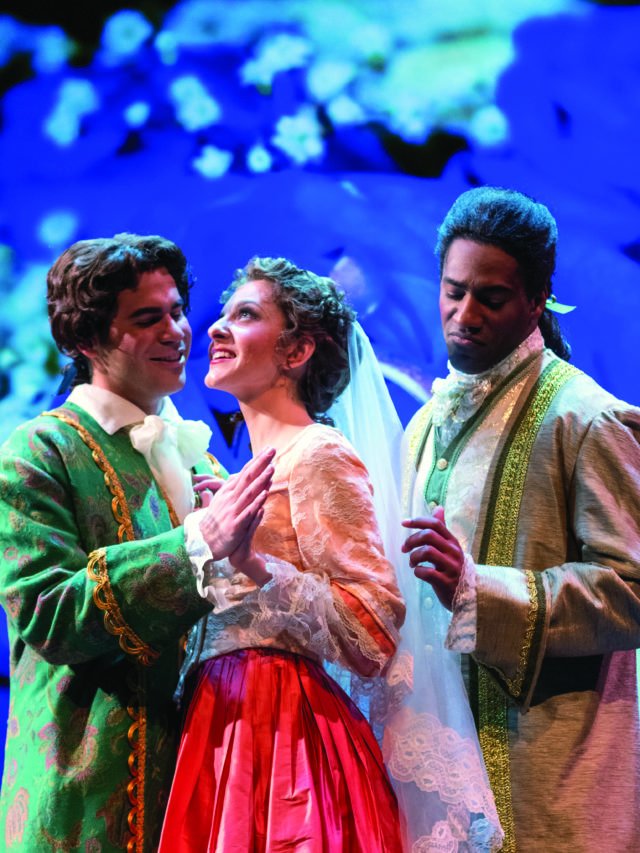
Conductor Nick Carthy says that Mozart’s The Marriage of Figaro is “the first great proto-feminist opera, and on top of that it’s subversive, it’s seditious, it’s bawdy, and Mozart wrote it!”
Widely considered one of the greatest operas ever written, The Marriage of Figaro will be presented by the University of Colorado Eklund Opera Program March 13-15. Carthy will conduct the student orchestra and cast, and Eklund Opera Program director Leigh Holman will be stage director.
Premiered in Vienna in 1786, Mozart’s The Marriage of Figaro was based on a play by the French playwright, diplomat, spy and satirist Pierre Beaumarchais. Because of its bitter satire of the aristocracy, Beaumarchais’ The Marriage of Figaro was banned in France and Austria. Mozart and his librettist, Lorenzo DaPonte, had to soften or suppress overt criticism of monarchy or aristocracy to pass the Austrian censors, but as Carthy suggests, there is more than enough implied criticism to make the story subversive in itself.
Figaro, servant to the Count Almaviva, is about to marry Susanna, servant to the Countess. The Count, however, desires Susanna and wants to re-instate an old feudal right for masters to sleep with servants when they marry. The Countess and Susanna, and to a lesser extent Figaro, plot together to embarrass the Count and force him to abandon his plans.
There are many other twists involving minor characters, but those revolve around, and reinforce the main themes of, the plot: Not only do the servants thwart their master — a common basis for comedy in the 18th century — but the women foil the men. That is especially powerful, and is one of the things — with Mozart’s music — that elevates Figaro above other operas of its time.
Placed at a country estate, Figaro is very much in the 18th century, but those underlying themes are still with us today. “If you look at Parasite, the Korean film that won Best Picture this year, that’s about servants getting the better of their masters and mistresses,” Carthy says. “There’s always been that clever working-class guy who gets one up on his master.”
As for the women who take down powerful men, Holman says “If you read the newspaper in the morning, you will understand Figaro at night.”
Mozart and DaPonte set up the themes of opera very carefully. At the outset, Figaro is being a traditional male —measuring for furniture — and Susanna is being a traditional female — admiring hats. But within moments she overshadows him, because she knows what the Count is up to and Figaro doesn’t — “Because I am Susanna and you are a fool,” she says.
As the opera continues, it is the Countess who dominates the action, and Figaro himself drops into the background and ends up being fooled, along with the count, by the women. The Countess “makes the journey from a gilded cage, to despair, to the count having to go down on his knees — in front of everybody! — to apologize,” Carthy says. This public apology may be the most subversive moment in the opera.
Considering that the play had been banned, and very publicly so, Figaro was a dangerous subject for anyone to take on as an opera. “Mozart and DaPonte made it subversive, but they did it in a different way,” Carthy says.
While the plot of The Marriage of Figaro is complex and based on the social conventions of 18th-century Europe, you need not study up to understand the opera. “Somebody who comes to the The Marriage of Figaro for the first time does not need to know about the French Revolution,” Carthy says. “The three-dimensionality of Mozart’s and DaPonte’s characters really, really comes forward.”
Figaro is the first of three operas that Mozart wrote with DaPonte, followed by Don Giovanni and Così fan Tutte. All three are revered by opera audiences, but Carthy has no doubt where Figaro stands among the three. “The other two are just simple works of genius,” he says. “But this one, Figaro, is unreachable.”
ON THE BILL: ‘The Marriage of Figaro’ by Mozart and Lorenzo DaPonte — presented by CU Eklund Opera Program. 7:30 p.m. Friday and Saturday, March 13 and 14; 2 p.m. Sunday, March 15, Macky Auditorium. Tickets: 303-492-8008, cupresents.org














